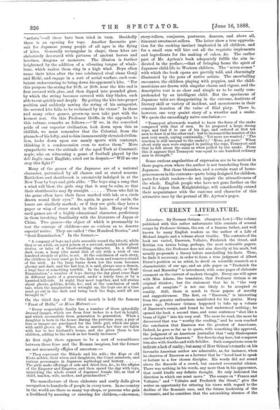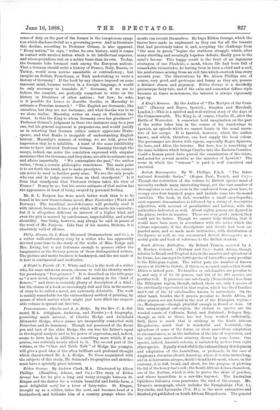CURRENT LITERATURE.
Literature. By Herman Grimm. (Sampson Low.)—The volume published with this rather unfortunate title consists of several essays by Professor Grimm, the son of a famous father, and well known to many English readers as the author of a Life of Michael Angelo and a volume about Goethe. The contents of the book are varied, Emerson, Voltaire, Frederick the Great, and Bettina von Arnim being, perhaps, the most noticeable papers. German-like, the Professor does not aim directly at his mark, but usually propounds a theory before marshalling his facts. Thus, he finds it necessary, in order to form a true judgment of Albert Darer's position as an artist, to dwell on scientific research as a characteristic of our age, and an able paper on "Frederick the Great and Macaulay" is introduced, with some pages of elaborate comment on the current of modern thought. Every one will agree with Miss Adams, the translator, that Professor Grimm is an original thinker ; but the statement that he is "the very prince of essayists" is not one likely to be accepted so readily. Still, there is much in these papers of novelty and suggestiveness. The first, on "Emerson," is interesting from the genuine enthusiasm manifested for his genius Many years ago, Professor Grimm happened to take up a volume of Emerson's essays, and found he had understood nothing ; he opened the book a second time, and some sentences "shot like a. beam of light" into his very soul. The more he read, the more he discovered that was "worthy the reading," and he soon reached the conclusion that Emerson was the greatest of Americans. Indeed, he goes so far as to quote, with something like approval, the judgment of an American journalist that "only Shakespeare can be named with Emerson." Nor does he stay here, but compares him also with Goethe and with Schiller. Such comparisons seem to indicate Mack of sanity; but many of Herr Grimm's remarks on his favourite American author are admirable, as, for instance, when he observes of Emerson as a lecturer that he "loved best to speak or lecture to a few chosen disciples. His words did not sound above the discords of a crowd, but exacted reverential silence. There was nothing in his words, any more than in his appearance, that could kindle any definite thought. He only indicated the direction in which one must move." The essays on "France and Voltaire," and "Voltaire and Frederick the Great," give the writer an opportunity for uttering his views with regard to the decline of the Romanic race, and the future leadership of the Germanic, and he considers that the astonishing absence of the sense of duty on the part of the former is the conspicuous symp- tom which discloses its fall as a governing power. And in literature this decline, according to Professor Grimm, is also apparent. 4` Every nation," he says, "Writes its own history, until it comes in contact with another nation which is its intellectual superior, and whose prejudices rest on a nobler basis than its own. To-day, the Germans take foremost rank among the European nations. That a German should write a history of France, Italy, Russia, or Turkey, would seem nowise unsuitable or contradictory ; but imagine an Italian, Frenchman, or Turk undertaking to write a history of Germany ! If the book by any chance imposed on some innocent mind, because written in a foreign language, it would be only necessary to translate it." Germans, if we are to believe the essayist, are perfectly competent to write on the history or literature of other nations ; but how, he asks, is it possible for Lewes to describe Goethe, or Macaulay to estimate a Prussian monarch ? "The English are Germanic, like ourselves, but they are not Germans; and what Goethe was to us we alone realise. Macaulay writes an essay on Frederick the Great. Is this the King to whom Germany owes her greatness ?" Professor Grimm's judgment in these two instances may be a just one, but his general argument is preposterous, and would justify us in retorting that German critics cannot appreciate Shake- speare, and that Ranke is incapable of understanding English history. Ma,caulay's manner of writing, we are told, gives the impression that he is infallible. A taint of the same infallibility seems to have infected Professor Grimm. Running through the essays, indeed, one notes the conviction expressed with singular assurance that the Germans, and they alone, are able to estimate men and affairs impartially. "We contemplate the past," the author writes, "from a certain philosophic remoteness. The main point is to set forth the truth, not to make proselytes. With us, science can never be used to further party aims. We are the only people who can and do judge events from an ideal standpoint." Is it from that standpoint that Professor Grimm takes his view of France ? It may be so ; but his severe estimate of that nation has the appearance at least of being swayed by personal feeling.



































 Previous page
Previous page